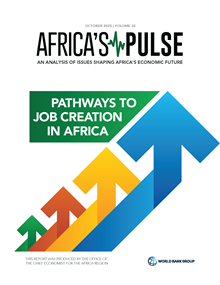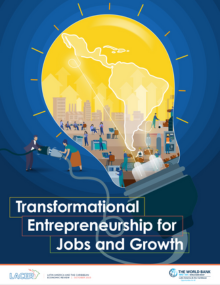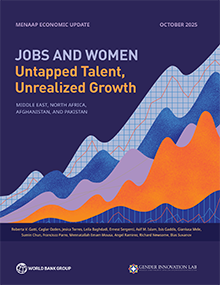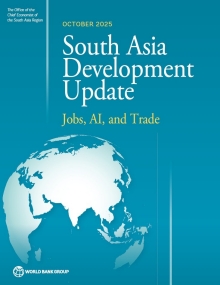Africa
The October 2025 edition of Africa’s Pulse shows that economic growth in Sub-Saharan Africa has maintained momentum amid heightened global policy uncertainty. Regional activity is poised to expand 3.8 percent in 2025, up from 3.5 percent in 2024, and accelerate further to an annual average rate of 4.4 percent in 2026–27. Jobs are the main channel through which people reap the benefits of economic growth. However, most new labor market entrants find work in low-productivity, informal sectors that offer limited prospects for rapid income growth, reduced poverty, and improved social mobility. Wage-paying jobs make up only 24 percent of employment, and less if Southern Africa is excluded. Sub-Saharan Africa requires a new growth model anchored in medium-sized and large enterprises, which are critical drivers of productivity and job creation.
Press Release: English | Español | Français | Portuguese
Learn More: Report | Publication page | Podcast
East Asia and Pacific
The East Asia and Pacific (EAP) region continues to outperform most of the rest of the world, but creating more jobs and sustaining growth will require ambitious reforms as the region navigates global uncertainties. EAP’s successful model for inclusive development faces new challenges. Recent job growth has been largely in low-productivity, often informal, service jobs that offer limited advancement opportunities. Moreover, young people are struggling to find jobs and women still participate less in the labor force. The share of the population vulnerable to falling into poverty is now greater than the middle class in most countries. Reforms and investments in human capital and digital infrastructure, greater competition in services, and policies can help ensure a match between job opportunities and people’s skills.
Press Release: English | Español
Learn More: Report | Publication page
Europe and Central Asia
Growth in the developing economies of Europe and Central Asia is likely to rise by 2.4 percent in real terms in 2025, down from 3.7 percent in 2024, driven primarily by a weaker pace of expansion in the Russian Federation. The region is also facing a jobs challenge, where most of the jobs created over the last 15 years have been in relatively low-skilled roles with limited earning potential. With a special focus on jobs, this report finds that investing in infrastructure, physical and human capital, such as education and skilling, improving the business environment and mobilizing private capital will be critical to jumpstarting productivity and creating jobs. These efforts will also help build a more resilient labor market given the region’s shifting demographics.
Press Release: English | Español | Russian
Learn More: Report | Publication page | Event
Latin America and the Caribbean
Latin America and the Caribbean continue their efforts to reignite growth and create more and better jobs, but progress remains constrained. The regional growth rate is expected to edge up slightly—from 2.2 percent in 2024 to 2.3 percent in 2025—even as many individual economies face downward revisions in their projections. These adjustments reflect, in part, an external environment that offers limited support, shaped by a cooling global economy, falling commodity prices, and greater uncertainty. In this context, empowering entrepreneurs and the private sector is essential. As central actors in economic progress, they can help fuel the rapid growth and job creation the region needs.
Press Release: English | Español | Français | Português
Learn More: Report | Publication page
Middle East, North Africa, Afghanistan, and Pakistan
Growth prospects in the Middle East, North Africa, Afghanistan, and Pakistan (MENAAP) are improving, in line with global trends, but conflict, fragility, and displacement remain persistent challenges. Regional gross domestic product is projected to grow by 2.8 percent in 2025 and 3.3 percent in 2026, up from 2.3 percent in 2024, driven by stronger-than-expected performance in Gulf Cooperation Council countries and developing oil importers. The latest MENAAP Economic Update argues that job creation and fully leveraging the region’s workforce are essential to raising living standards. In this context, the low levels of female labor force participation in the region remains a major obstacle. This report analyzes the barriers—from household dynamics and social norms to legal frameworks and a sluggish private sector—that limit women’s economic participation and makes a compelling case for expanding their role in MENAAP labor markets.
Press Release: English | Español | Français | العربية
Learn More: Report | Publication page
South Asia
South Asia is the fastest growing region in the world, with growth projected to be robust at 6.6 percent in 2025. But a significant slowdown to 5.8 percent is expected in 2026. Downside risks include spillovers from the global economic slowdown and uncertainty around trade policy, socio-political unrest in the region, and labor market disruptions posed by emerging technology such as artificial intelligence (AI). Reforms to promote trade openness and technology adoption could be transformative for South Asia, helping the region create jobs and catalyze growth.
Press Release: English | Español
Learn More: Report | Publication page | Blog | Event






